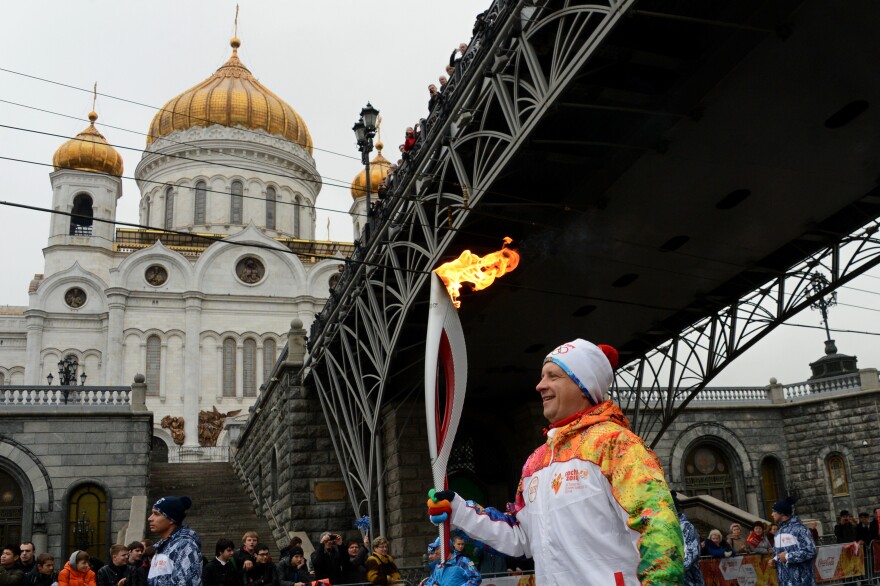The 2014 Winter Olympics in Sochi, Russia, open in February, just 100 days from now.
The games have already given rise to some superlatives: most expensive (at more than $50 billion), most heavily guarded and, potentially, most controversial.
Here are key questions surrounding the Sochi games, and some answers:
An Islamist militant leader has called on Muslim fighters to attack the Olympics. Can Russian officials keep visitors and athletes safe?
The mountains that will be the site of the Alpine events are part of the North Caucasus, a mostly Muslim region of Russia that includes Chechnya and Dagestan.
Both areas have been plagued by separatist violence. Russia fought two wars to keep control of Chechnya, and Dagestan is currently the scene of a long-running insurgency.

Earlier this year, Chechen militant Doku Umarov issued a video statement in which he called on fellow rebels to attack the Olympics.
Russia has responded by deploying tens of thousands of soldiers and police to the Sochi area, backed up by surveillance cameras, drones and robots.
Authorities have said they will be monitoring all communication in the region, including mobile phones and email.
Security experts say it will be difficult to stage any kind of large-scale attack on the games themselves.
What about attacks elsewhere in Russia? Will people be safe in Moscow or St. Petersburg?
There was a bus bombing in the southern Russian city of Volgograd earlier this week that killed six people and wounded more than 30.
Police say a woman from Dagestan carried out the suicide attack.
There's no indication that attack had any link to the Olympics in Sochi, but it shows how relatively easy it might be to stage a spectacular attack somewhere else in Russia while the Olympics are going on.
A really severe attack could throw the country into crisis and would sap attention from the games — and it's not at all clear that the officials are ready for that.
The Sochi Olympics have also been the focus of a controversy over lesbian, gay, bisexual and transgender (LGBT) rights in Russia. How will that affect the games?
Russian President Vladimir Putin addressed that issue again Monday, as he was taking the new head of the International Olympic Committee, Thomas Bach, on an inspection tour of Sochi.
Putin said all participants would be made to feel welcome, "regardless of nationality, race or sexual orientation."

The reason that assurance was necessary was that Russia has a law that limits gay rights — specifically, it bans giving information to minors about "nontraditional" sexual relationships.
The law is so vaguely worded that it could ban any discussion about same-sex issues, or any expression of gay pride, such as a march.
There have been calls for boycotts, urging people to stay away from the Olympics. Is that a cause for concern?
It has aroused some concern among officials, who fear that foreign disapproval of the law could keep fans away.
Some prominent LGBT activists in Russia are saying that would hurt athletes and fans without addressing the government's role in this law.
They want the major, longtime Olympic sponsors to make some gestures in support of LGBT rights that would put the issue in the spotlight.
Masha Gessen, a journalist and a prominent LGBT activist, recently told The New Yorker that Coca-Cola could put a rainbow on all its cans of Olympic Coke.
Coca-Cola is scheduled to make an announcement on whether it will address the issue during the games.
Olympic sponsors are probably going to be reluctant to make political statements during a supposedly nonpolitical event, especially if it embarrasses the host country.
Activists may stage protests of their own that will challenge the law.
One of the unusual things about the 2014 Winter Games is that they're being held in a subtropical climate. Will there be enough snow for Alpine events?
Sochi is a resort town on the Black Sea that's known for its palm trees and balmy climate. The temperature, which rarely gets below freezing, has been running lows of about 50 degrees and highs of around 70 degrees over the past week.
The venues for skating events, such as hockey, speedskating and figure skating are all near the seashore, where the main challenge is keeping the ice cold and the spectators warm.
The Alpine events will take place in the mountains, about half an hour away by train. The area gets significant snow during the winter, but it's not absolutely certain that there will be enough during the games.
Olympic planners have stored some of last year's snow, by heaping it in gullies and keeping it covered during the summer. That could provide the base for the ski runs.
But the main snow surface will provided by snow-making machines — "snow cannons" — that will spew clouds of fresh snow that conform to standards for international competitions.
Copyright 2021 NPR. To see more, visit https://www.npr.org.



